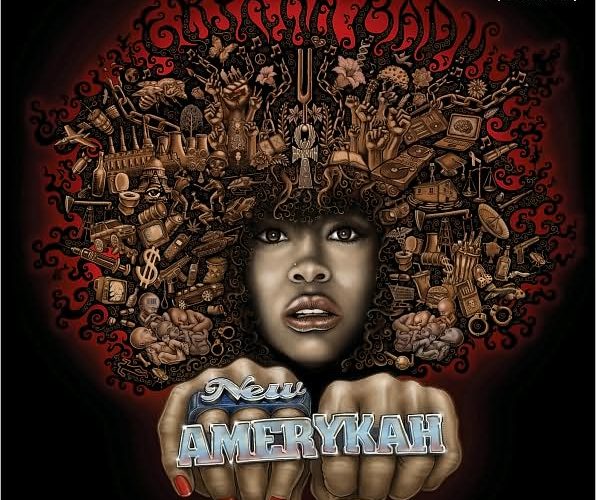Thank God for the internet, because without it we’d probably still be waiting for a new Erykah Badu album. It’s been eight years since her last full album, and it could’ve have been eight more had someone not given her a Mac as a present a few years ago. All of a sudden her chat buddies where IMing her to get back into the studio, and sending her tracks. This wouldn’t be such a big deal except that her chat buddies were people like Madlib, 9th Wonder, and the late J Dilla. Her son Seven taught her how to use her laptop as a mini recording studio, and the seeds of a masterpiece were planted.
And let’s just be clear: “New Amerykah Part One (4th World War)” IS a masterpiece, the perfect fusion of hip-hop, classic funk and soul, and modern R&B. It is both political and deeply personal, contemporary and old school, referencing the psychedelic soul of the late sixties and seventies (it was recorded in Electric Ladyland Studios), and realizing the anger and optimism of that era.
The album starts of with “Amerykahn Promise,” a blast of P-funk guitars and horns. Ms. Badu does her best soul sister wailing while an announcer declares: “We take your history and make it a modern mystery, you hear what I’m saying? Welcome all! We love to love you! We love to suck you dry. All the while, we keeping you high.”
It goes immediately into the Madlib-produced “The Healer,” which sees the master crate digger/musician/recycler exploring some of the minimalist funk he first played with on his Beat Konducta albums. Ms. Badu is in stoner witch mode, singing her lyrics as if they were an incantation, and what a spell she’s weaving:
“It’s bigger than religion (hip-hop)
It’s bigger than ‘ma nigga’ (hip-hop)
It’s bigger than the government
This one is for Dilla
We ain’t dead, don’t believe it
We just made ourselves invisible
Underwater, stove top, blue flame, scientist
Come out with your scales up get baptized in the ocean of the hungry
When niggas turn into gods, walls come tumbling”
The next track is the soulful, personal “Me,” in which Ms. Badu lays out her life and the struggle of growing as a public figure:
“Sometimes it’s hard to move you see
When you’re growing publicly
But if I have to chose between, I choose me
Had two babies different dudes
And for them both my love was true
This is my last interview
Hey that’s me
This year I turn 36
Damn it seems it came so quick
My ass and legs have gotten thick
It’s all me”
Sa-Ra Creative Partners layers the track with acoustic guitars, keyboards, and a shuffling drumbeat, creating a mellow soul track filtered through a hip-hop lens. Sa-Ra and Ms. Badu get a little more out there on “Twinkle,” which is sparse and stuttering, and sees Ms. Badu lamenting the state of the African-American community in her angelic voice:
“They don’t know their language
They don’t know their God
They take what they’re given
[…]
They say their grandfathers and grandmothers work hard for nothing
Cause we still in this ghetto
So
They end up in prisons
They end up in blood”
Her dismay and empathy for the younger generation in something only a mother could express, and is one of the most moving aspects of this album. She isn’t lecturing, she isn’t talking conspiracy theories, and she isn’t feeling sorry for herself. Instead, she’s laying out the problems of the world with love and sympathy, making the listener care and making them want to be part of the solution. Not that there isn’t plenty of anger as well. She allows “Twinkle” to devolve into a male voice angrily indicting the state of the world, perhaps to offer a father’s less generous perspective. “My People” sees Ms. Badu on a similarly political bent, backed by another minimalist Madlib beat.
“That Hump” and “Honey” are the most “conventional” R&B tracks on the album: “That Hump” is pure smooth neo-soul, and the 9th Wonder-produced “Honey” is the closest thing to a single the album has. They sandwich the delicate, beautiful “Telephone,” which serves as a eulogy to J. Dilla, complete with the mournful sirens from “Donuts.”
Georgia Anne Muldrow offers her voice to “Master Teacher,” while Sa-Ra Creative Partners chops up Curtis Mayfield’s “Freddie’s Dead.” The result is a unique combination of easy-going soul and glitchy hip-hop, and the idyllic vibe is further complicated by lyrics like “What if there was no niggas only master teachers?” This mixing of old and new, and additional layer of lyrical and emotional complexity why “New Amerykah” is such a remarable album. It’s classic soul with hip-hop edge, referencing the old while being totally contemporary. It’s angry yet beautifully sung, it’s political and yet totally personal, it’s daring and complicated and yet enjoyable to listen to…In short, it is one of the best albums of the year, and could be one of the best albums of the decade. It is also a real album, complete with artwork, lyrics, and all the things that make physical copies more compelling than electronic copies. Not to dis digital files: after all, it is thanks to the internet that we have this album, and she has a sequel set to drop in the summer.

